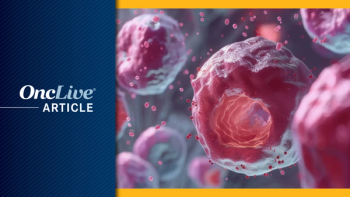
FDA Approval Sought for Neoadjuvant Pembrolizumab/Chemo Plus Adjuvant Pembrolizumab in Resectable Stage II or IIIA/B NSCLC
The FDA has accepted a supplemental biologics license application for neoadjuvant pembrolizumab in combination with platinum-containing chemotherapy, followed by adjuvant pembrolizumab monotherapy, for the treatment of patients with resectable stage II, IIIA, or IIIB (T3-4N2) non–small cell lung cancer.
The FDA has accepted a supplemental biologics license application (sBLA) for neoadjuvant pembrolizumab (Keytruda) in combination with platinum-containing chemotherapy, followed by adjuvant pembrolizumab monotherapy, for the treatment of patients with resectable stage II, IIIA, or IIIB (T3-4N2) non–small cell lung cancer (NSCLC).1
The sBLA was supported by newly reported data from the phase 3 KEYNOTE-671 trial (NCT03425643), which showed that neoadjuvant pembrolizumab plus chemotherapy followed by adjuvant single-agent pembrolizumab demonstrated a statistically significant improvement in event-free survival (EFS) compared with preoperative chemotherapy alone, meeting the co-primary end point of the study.
Findings from a prespecified interim analysis also showed statistically significant improvements in key secondary end points of pathological complete response (pCR) and major pathological response (mPR).
Full results from the analysis will be presented at an upcoming medical meeting. The FDA set a target action date of October 16, 2023, under the Prescription Drug User Fee Act.
“Results from KEYNOTE-671 show that [pembrolizumab] in combination with chemotherapy provided significant improvement in EFS, pCR and mPR over chemotherapy alone as a perioperative treatment regimen for patients with resectable stage II, IIIA or IIIB NSCLC,” Eliav Barr, MD, senior vice president, head of global clinical development and chief medical officer, Merck Research Laboratories, stated in a news release. “By moving this [pembrolizumab]-based regimen into earlier stages of NSCLC, we may be able to significantly reduce the risk of recurrence for these patients. This study is an important milestone, and we look forward to sharing the detailed results with the medical community as soon as possible. We thank the patients and investigators for their important contributions to this study.”
The randomized, double-blind KEYNOTE-671 trial enrolled patients with previously untreated and pathologically confirmed resectable stage II, IIIA or IIIB (T3-4N2) NSCLC with an ECOG performance status of 0 or 1 within 10 days of randomization and adequate organ function.2
Key exclusion criteria included patients with NSCLC involving the superior sulcus, large cell neuroendocrine cancer, or sarcomatoid tumor; a history of or current pneumonitis/interstitial lung disease requiring steroids; active infection requiring systemic therapy; or prior allogenic tissue/solid organ transplant.
The trial enrolled 786 patients who were randomly assigned in a 1:1 fashion to the pembrolizumab arm and the control arm.1 In the experimental arm, patients received neoadjuvant therapy with 200 mg of intravenous (IV) pembrolizumab once every 3 weeks for up to 4 cycles, plus 75 mg/m2 of IV cisplatin on day 1 of each cycle with either 1000 mg/m2 of IV gemcitabine on days 1 and 8 of each cycle or 500 mg/m2 of IV pemetrexed (Alimta) on day 1 of each cycle prior to surgery, followed by adjuvant therapy with 200 mg of IV pembrolizumab every 3 weeks for up to 13 cycles. The control arm featured the same chemotherapy regimen with a saline placebo in place of pembrolizumab.
EFS and overall survival (OS) served as the trial’s co-primary end points. Investigators will continue to evaluate OS. Secondary end points included pCR and mPR.
Regarding toxicity, no new safety signals were reported.
References
- Merck announces phase 3 KEYNOTE-671 trial met primary endpoint of event-free survival (EFS) in patients with resectable stage II, IIIA or IIIB non-small cell lung cancer. News release. Merck. March 1, 2023. Accessed March 1, 2023.
https://www.merck.com/news/ - Efficacy and safety of pembrolizumab (MK-3475) with platinum doublet chemotherapy as neoadjuvant/adjuvant therapy for participants with resectable stage II, IIIA, and resectable IIIB (T3-4N2) non-small cell lung cancer (MK-3475-671/KEYNOTE-671). ClinicalTrials.gov. Updated August 19, 2022. Accessed March 1, 2023.
https://clinicaltrials.gov/ct2/show/NCT03425643



































